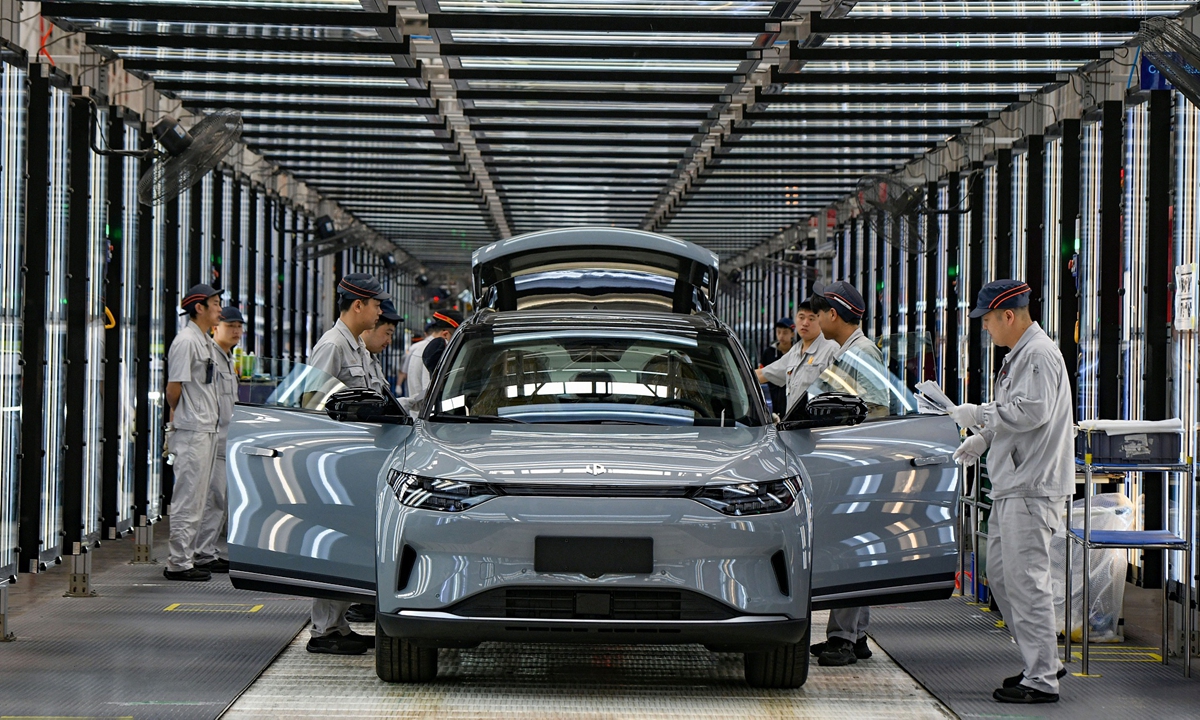
Workers complete assembling an electric vehicle (EV) at China's EV start-up Leapmotor in Jinhua, East China's Zhejiang Province on April 1, 2024. The smart EV factory delivered 14,567 new vehicles in March, a yearly increase of 136 percent. Photo: VCG
EU member states reportedly completed an "advisory" vote on Monday regarding the additional tariffs on imports of China-built electric vehicles (EVs) with mixed results, Reuters reported.
Experts believe that the reported division of opinion highlights obstacles to putting up barriers on Chinese EVs within the bloc. They called on the EU to take into account different opinions among member states and to find a balance of interests in negotiations with China over the ongoing tariff dispute.
Italy and Spain are backing tariffs, government sources said ahead of a Monday midnight local time deadline for all 27 EU members to take their stand, Reuters reported.
Sweden plans to abstain.
Germany is also set to abstain, sources said on Friday. Poland's development ministry said Warsaw's position was still the subject of consultations between ministries. Greece had yet to take a position as of Saturday, according to the report.
The European Commission said that the vote is confidential and it will not disclose the outcome. It is also non-binding, according to the report.
The EU has imposed provisional duties of up to 37.6 percent on EVs imported from China, which drew wide criticism from both domestic and foreign industries and some EU members, including Germany and Hungary.
"The division among EU members... is driven by their own industries' benefits, the scale of their auto industries, and the costs they would have to bear by blocking Chinese EVs. This is why we see some countries abstaining or opposing the tariffs," Bai Ming, a research fellow at the Chinese Academy of International Trade and Economic Cooperation, told the Global Times on Tuesday.
Some EU members' decision to abstain in the vote is an important reflection of opposition to the tariffs, experts said.
Bai noted that for example, Sweden's decision to abstain may be influenced by the fact that its automotive industry -- as shown by Volvo's acquisition by China's Geely Auto -- has strong ties to China.
Hungary on Wednesday voiced opposition to the additional tariffs.
Hungary's opposition could be linked to the investments made by Chinese companies such as BYD in the country, which are seen as beneficial for Hungary's development, Bai added.
The reported vote shows that the EU is deeply divided on the issue, making it difficult to reach a consensus, Cui Hongjian a professor at the Academy of Regional and Global Governance of the Beijing Foreign Studies University, told the Global Times on Tuesday.
There is a possibility that the EU will find a compromise that takes into account the differing opinions of its member states, rather than blindly following the demands of certain members that demand tariffs while ignoring the concerns of others, Cui said.
Experts said that EU should seek a reasonable resolution to the dispute, avoid a trade war and move in the right direction in negotiations with China.
It is crucial for the EU to engage in negotiations with China to find a balance of interests in the ongoing tariff dispute, Bai said.
China's Ministry of Commerce (MOFCOM) last week urged the EU to make decisions
based on facts and rules regarding its anti-subsidy investigation of Chinese EVs.
He Yongqian, a MOFCOM spokesperson, emphasized the importance of the EU recognizing mutually agreed-upon facts and rules, rather than making unilateral assertions.
Europe should acknowledge that China's competitive advantages in the EV sector do not stem from subsidies, and that cooperation between China and the EU benefits both parties, while European automakers are against trade protectionism as well, the spokesperson said.




